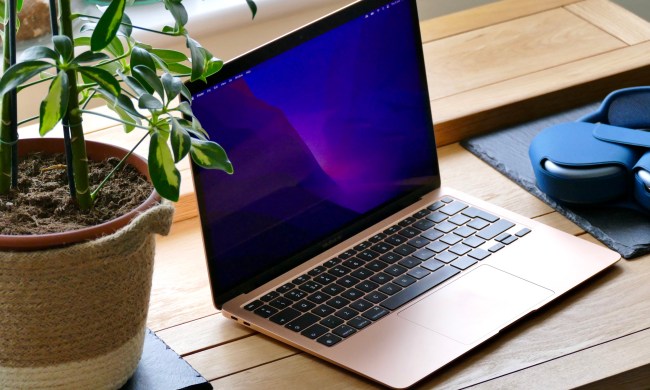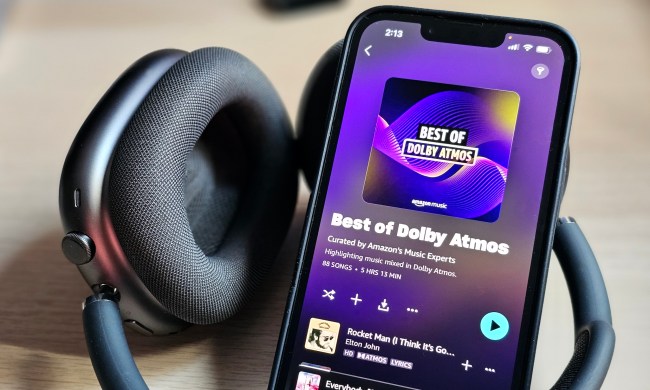If you’ve recently bought a pair of Apple AirPods or are considering it because all your searching has proven that they’re some top-notch earbuds, you might be curious if they’re waterproof. The short answer is no, so it’s best to avoid using them in overly rainy conditions or around water. However, you’re in for some good news if you’re eyeing the most recent AirPods models. The third-gen AirPods, AirPods 4, AirPods 4 with ANC, and all versions of the AirPods Pro are indeed water-resistant.
Let’s examine what this means and examine how each AirPods model handles water. We’ll also discuss the levels of water resistance and what that means for your use. Let’s dive in.
Water resistant vs. waterproof
As we mentioned above, none of Apple’s AirPods — AirPods, AirPods Pro, or AirPod Max — are waterproof. But what is “waterproof” anyway? From an electronic device standpoint, being waterproof means that the device is watertight and can be completely submerged in water. There’s a common ratings system designed for electronics to measure this (as well as dust and dirt resistance) known as the IP (Ingress Protection) rating, which we cover in our post on the water-resistance rating system.
Water resistance, on the other hand, is much more limited and means that the device can only withstand things like sweat or splashes or sprays of water at different intensities for different periods of time. These are also identified on the Ingress Protection scale, so it’s good to know what the levels are before you buy.
In the case of Apple’s AirPods, they are not created equal. Let’s get into them now.
AirPods 1 and 2: No water resistance
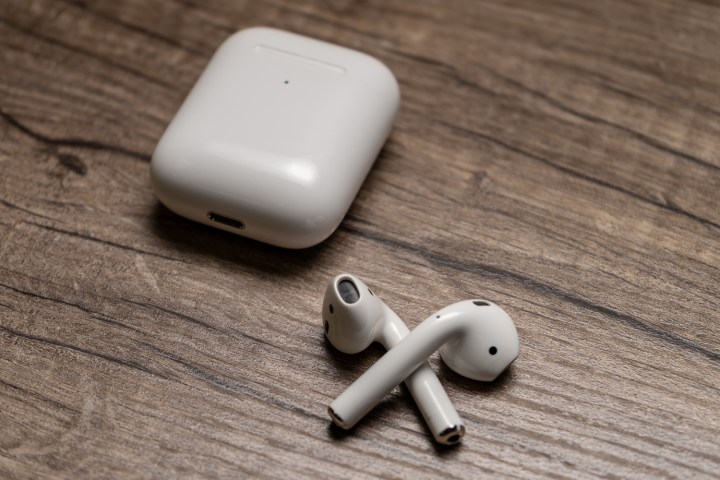
Though both the first and second-gen AirPods 2 are now discontinued, we’ve decided to keep them in this list as a reference. Without any official protection from water, you aren’t going to want to take these AirPods out in the rain or any place they can get wet. Encounters with splashing water, like raindrops or sweat from exercise, can damage these AirPods, though Apple has always maintained they’ll be fine under “normal” use. There are some AirPod accessories that can help waterproof your charging case, but not the AirPod earbuds themselves.
AirPods 3: IPX4 sweat and water resistance
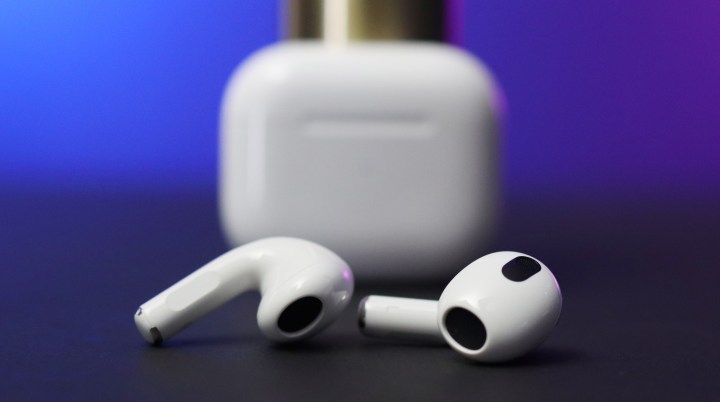
For the AirPods 3, Apple made a slew of updates to both the audio features and design. But one very important update was adding water resistance to the line at last.
The AirPods 3 have an IPX4 water-resistance rating. This is a rating type created by the IEC (International Electrotechnical Commission) and is commonly used for all types of headphones and earbuds, among other electronics.
IPX4 specifically means that the AirPods 3 are resistant to “water splashes from any direction.” That’s somewhat technical, but it basically means that the AirPods 3 are fine to use in the rain, while sweating, while cooking, etc. If you are looking for AirPods that you can safely use while jogging or working out in any kind of weather, here’s where that becomes feasible.
However, IPX4 does not mean these AirPods are entirely waterproof. You cannot submerge them safely for any length of time (that kicks in at IPX7), so don’t even think about wearing them swimming. You won’t be able to take a shower with them on, either, and it’s not a great idea to wear them near a body of water like a river or lake.
AirPods 4, AirPods 4 with ANC: IP54 dust, sweat, and water resistance

The newest additions to the AirPods family are slightly more rugged thanks to the 5 in IP54, which denotes dust protection. It means dust may be able to get into the device, but it won’t adversely affect operation in any meaningful way. So the AirPods 4 and AirPods 4 with ANC have the same level of water protection as the third-gen AirPods, but also enjoy protection from dust too.
This rating applies to both the earbuds and their charging case.
AirPods Pro 2: IPX4; AirPods Pro 2 with USB-C: IP54

This is a confusing one, since Apple released the AirPods Pro 2 in 2022, and then the AirPods Pro 2 with USB-C in 2023. You might think that the USB-C portion was the only change, but Apple also improved protection, from IPX4 on the AirPods Pro 2 to IP54 on the AirPods Pro 2 with USB-C.
While you wouldn’t want to take them swimming — as some headphones are designed for — you don’t have to worry about rain. Apple doesn’t suggest putting them under running water or wearing them in the shower, but incidental contact with water shouldn’t be a problem.
As with the fourth-gen models, the charging case for both versions of the AirPods Pro 2 gets the same level of protection. We still don’t advise getting water on the inside of the charging case, though.
AirPods Max: No water resistance
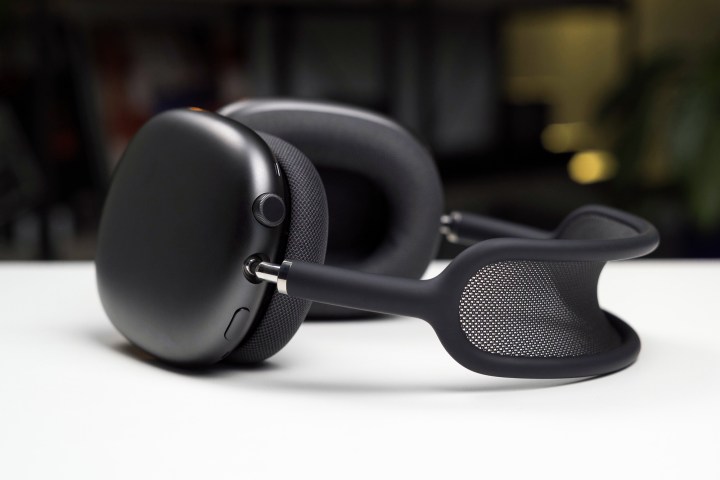
The AirPods Max are in a slightly different category, as they are over-ear headphones instead of wireless earbuds. However, they lack any type of water resistance at all. Combine that with their over-ear design that makes them more susceptible to getting wet from rain or other sources, and you really don’t want to risk these AirPods. Keep them indoors whenever possible.
What about AirPods charging cases?
Up until recently, there were no AirPods charging cases that were water resistant, but that changed with the latest third-generation of AirPods, which now gets an IPX4 rating for its MagSafe and Lightning cases, and the second-gen AirPods Pro (Lightning or USB-C), which enjoy the same rating for their MagSafe cases.
Looking ahead
It is possible that upcoming versions of AirPods will have better water and dust resistance. Other companies already incorporate such features in their products. For instance, the Jabra Elite 8 Active earbuds have an IP68 rating, which means they can survive being submerged in up to 1.5 meters of water for up to 30 minutes.
What should you do when your AirPods get wet?
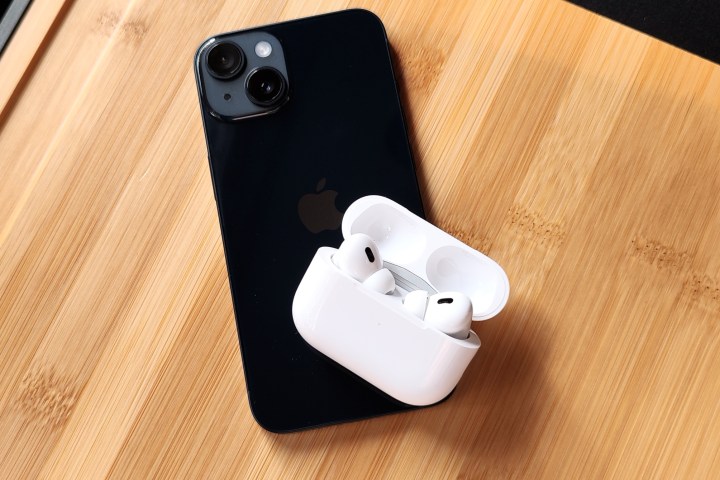
Accidents happen, and a quick spill can get an AirPod wet or submerge it entirely. That doesn’t spell instant doom for the hardy AirPods, but you’ll need to act fast for the best results:
Step 1: Immediately remove them from water or rain, power off, and disconnect from device.
Step 2: Use a soft cloth to wipe your AirPods dry. Shake gently to remove water from crevices.
Step 3: To dry your AirPods, first, find an open and dry spot where they are safe. Remove them from the charging case and don’t put them back in if they are wet. Allow them to air dry completely for at least 12 hours. If they were fully submerged in water, it is recommended to wait for a full day. Do not use compressed air, a hair dryer, or any form of heat to dry them as it may cause additional damage.
You may have heard that rice can be used to quickly dry electronics, but we think this might cause more harm than good — getting tiny rice particles in the openings could be problematic. If you have any packages of silica gel around, these make a safe rice substitute.
Step 4: After waiting, place the AirPods back in the charging case, charge them again, and then attempt to reconnect.



